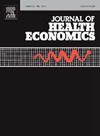医生是否助长了医疗服务中的社会经济不平等?突尼斯的审计实验。
IF 3.6
2区 经济学
Q1 ECONOMICS
引用次数: 0
摘要
在本文中,我们探讨了健康不平等的一个重要但未被充分研究的驱动因素:医生是否在临床遇到不同社会经济背景的患者时采取不同的治疗方法。我们在突尼斯设计了一项审计实验,将具有相同症状的标准化患者送到130名公立和私立初级保健医生那里进行咨询。通过深入的定性工作,我们改变了病人的态度和外表,使他们看起来像是“穷人”或“中产阶级”。我们没有发现任何证据表明医生对病人的管理方式有所不同,但他们对病人的社会经济状况做出了回应,开出了更少的昂贵药物,并向较贫穷的病人提供了更多的免费药物。我们还发现,患者之间的沟通也存在显著差异:医生更有可能对病情丰富的患者提供更多的解释,包括诊断、处方药物和治疗方案。这些差异不能用时间限制来解释,因为医生在这两种类型的患者身上花费的时间相当。在某种程度上,与患者沟通的差异会导致患者健康决策的差异,我们的研究结果表明,医生可能间接导致健康不平等。本文章由计算机程序翻译,如有差异,请以英文原文为准。
Do doctors contribute to socioeconomic inequalities in health care provision? An audit experiment in Tunisia
In this paper, we explore an important but understudied driver of health inequalities: whether doctors treat patients from different socioeconomic backgrounds differently during a clinical encounter. We design an audit experiment in Tunisia, sending standardised patients with the same symptoms to 130 public and private primary care doctors for consultation. Informed by in-depth qualitative work, we vary the attitude and appearance of the patients so that they appear to be “poor” or “middle-class”. We find no evidence that doctors manage patients differently, but they respond to the socioeconomic profile of patients by prescribing fewer expensive drugs and giving out more free drugs to poorer patients. We also show significant differences in communication between patients: doctors are more likely to provide more explanation to richer patients about the diagnosis, the drugs prescribed and the treatment plan. These differences are not explained by time constraints as doctors spent comparable time with both types of patients. To the extent that differences in communication with patients can lead to differences in patients’ health decisions, our results suggest that doctors could contribute indirectly to health inequalities.
求助全文
通过发布文献求助,成功后即可免费获取论文全文。
去求助
来源期刊

Journal of Health Economics
医学-卫生保健
CiteScore
6.10
自引率
2.90%
发文量
96
审稿时长
49 days
期刊介绍:
This journal seeks articles related to the economics of health and medical care. Its scope will include the following topics:
Production and supply of health services;
Demand and utilization of health services;
Financing of health services;
Determinants of health, including investments in health and risky health behaviors;
Economic consequences of ill-health;
Behavioral models of demanders, suppliers and other health care agencies;
Evaluation of policy interventions that yield economic insights;
Efficiency and distributional aspects of health policy;
and such other topics as the Editors may deem appropriate.
 求助内容:
求助内容: 应助结果提醒方式:
应助结果提醒方式:


